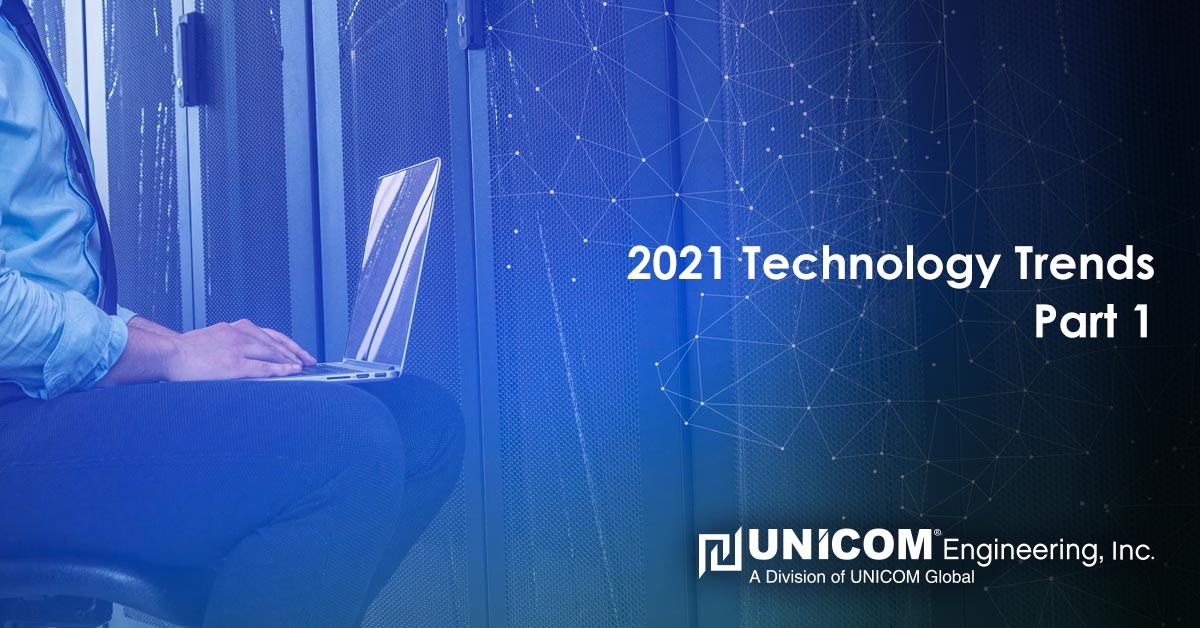It's no surprise that the events of 2020 have pushed many of the world's workforce to be mobile. However, moving forward, for the software industry, this is a trend that's not likely to reverse itself. Experiencing less need for real estate, many corporations will keep workers remote and expect them to perform at increasingly higher levels.
Therefore, the mobile and IoT devices workers use, and the networks that support them will need to be up to the challenge. Whether through transparency and security of data, the rise of edge computing, or container technology's maturation, the tech world is changing rapidly to meet growing needs.
In a two-part series, we'll examine the most important tech trends and what they mean to your organization, your clients, and their users. We'll look at what all three of these groups value the most: data for our first trend.
Technology Trends Point Toward Data
Experts at Dell Technologies have proclaimed, in their 2020 Server Trends and Observations brief, the 2020s to be the 'Decade of Data.' That's because more and more of our important personal and business decisions rely on it. So how we access and secure our data will be at the forefront of all significant changes for years. After all, what would applications be without data? Over the years, our focus on data has evolved far beyond mere one-way storage and retrieval. Data now flows in multiple directions between corporations, their users, partners, and vendors. Recently, ethical concerns about private information have arisen. California's new Consumer Privacy Act is a prime example. High profile breaches in the news have also called data security into question. When using software applications, corporations and consumers want to know that their privacy remains intact and their data safe.
In response, the tech industry will need to innovate to protect data of all kinds from misuse. Look for privacy and protection to be a vital area of development in the coming decade. In support of this trend, VC funding will continue to flow into cybersecurity startups who will use blockchain, AI, and ML to meet the challenge.
Hardware vendors and integrators also play a role in data security. Increased resiliency standards in manufacturing and greater visibility of the hardware supply chain will harden servers from threats and make them traceable back to their point of origin.
The Server Plays a Key Role
Behind the scenes, supporting data's growing importance will be ever-sophisticated servers. No longer will software providers be bound by latency-laden cloud architectures. Servers in multiple roles will make more data available in more places at business-critical speed. And they will connect to more 5G networks and IoT devices than ever before.
Most of us would agree, the enemy of application performance is latency, and physical distance can play a factor. Even the best-written code can be no match for a network design that doesn't support it. As a result, architectures designed around the software's data needs will replace the traditional cloud-only philosophy.
For example, Mobile Edge Computing, or MEC, places server hardware in Telco's radio access networks to allow processing to take place in closer network proximity to the field. This change in design will level the playing field between the onsite and mobile user experience.
To make this change happen, network-based servers within edge data centers will free up processing power and enhance the performance of critical applications such as yours. Vendors like Dell Technologies and Intel have built solutions up to the task, and their partners, like UNICOM Engineering, stand ready to roll them out.
From Boxes to Containers
As servers move closer to users, container environments will create virtual machines that perform better than their physical predecessors. No longer will computing be defined strictly by physical boxes in data centers. Kinetic hardware design will enable applications to seize the benefits of increased hardware capacity in real-time and allow container environments to scale as necessary.
As a result of dynamic scaling, applications running in dedicated containers will offer faster, more reliable performance. Also, facilitating this change will be better telemetry of container performance to guide scheduling. Therefore, resource-intensive operations can run around the needs of business users.
What these Data Tech Trends Mean to Your Organization
Knowing what changes lie on the horizon can be helpful. Sometimes, predicted events arrive on your doorstep much earlier than expected, like in the form of a dramatic shift of the world's work to mobile computing. Planning for these changes is the key to not falling victim to them.
As your clients demand better performance from your software, UNICOM Engineering stands ready to help. From design to branding to logistics and support, their team of experts will provide you with the right services when you need them. For more information, check out our Design and Engineering Video and contact us today to schedule your consultation.
